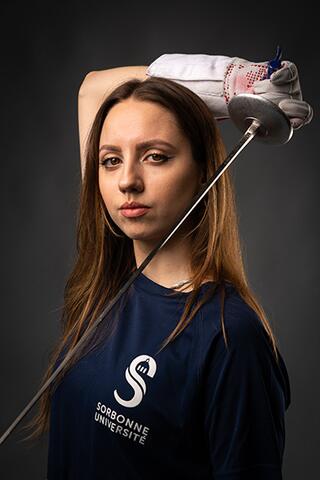
Alice Recher
High-level fencer and art history student
Maintaining mental health during competition is at least as important as physical health.
Flag bearer at the age of 11 for the 2010 world fencing championships at the Grand Palais, Alice Recher, an art history student, will intends to compete as a foil fencer at the next Olympic Games in Paris.
How did your passion for fencing start?
At the age of five, while watching the Athens 2004 Olympic Games with my family, I immediately wanted to do this sport when I saw two fencers competing on a track. At the start of the school year, my parents signed me up for the Suffren Fencing Circle where the fencing master, Jean-Pierre Mazzella, accepted me despite my young age because I held a foil without difficulty. From that moment on, I never stopped training.
What are you studying right now?
While I initially wanted to become a surgeon in obstetrics and gynecology, my interest in art and literary subjects led me to turn to a degree in Art History and Archeology offered by Sorbonne University after my scientific baccalaureate. Today in my first year of this master’s specialty and a few months before the defense of my thesis on the use of color in the cinema of Jacques Demy, I am thinking about the subject of my continued studies. The gap year in 2024 for the Paris Olympics will give me time to think it over.
How do you combine your studies and high-level sport and how does Sorbonne University support you in this dual project?
Since I was little, I have managed to reconcile the two. And when the pace of my training and competitions increased, my status as a high-level athlete (SHN) allowed me to have attendance exemptions and to complete my courses at a slower pace for my bachelor’s and master’s programs, over several years.
Today, I live and train at Insep (the National Institute of Sport, Expertise and Performance) for an average of five hours a day, five days a week, not counting competitions and physical therapy sessions that I need. I work on my classes and my dissertation in the evening and, sometimes, one or two hours before my training or when a half day becomes available.
I have also been lucky to benefit from the “Passport for the Olympics” scholarship program supported by Crédit Agricole d'Ile-de-France Mécénat and the Sorbonne University Foundation. This in particular enabled me to acquire the equipment necessary for my research, and to save a lot of time in my work.
What do the Paris Olympics mean to you?
If I've been training for all these years, it's for this day of possibilities! The prestige is immense, but it is also the occasion for surprises, even releases you sometimes.
The fact that it happens in your country, with your audience, creates an intense emotion that can give a lot of strength. Competing at the Grand Palais is also quite a symbol for me because I was there at the age of 11 as a flag bearer for the 2010 world championships.
How do you prepare?
My preparation begins with physical therapy and strengthening of my left ankle, because I had surgery after a serious sprain. I then have to find a balance between physical preparation, specific training and competitions so as not to arrive exhausted at a World Cup event—multi-year events that are decisive for qualification for the European and World Championships and the Olympic Games. To progress, I regularly question my work and I don't hesitate to look elsewhere for what I might be missing.
The last essential aspect is mental preparation. I have been followed by a psychologist from Insep for a year and a half to maintain “a healthy mind in a healthy body”. While the topic is still taboo, mental health is nevertheless as, if not more, important than physical health.
Do you have a ritual before each competition?
Yes, my warm-up. It is largely based on mobility: a moment in music, which allows me to reach, depending on my needs of the moment, either a certain level of concentration and calm, or a state of extreme motivation with a great thirst for to “do it”.
What has been you most memorable competition?
My most vivid memories are perhaps also the most vague. There is a sort of dissociation, like in certain dreams, caused by euphoria. I remember a competition that was a turning point: the Challenge International des Hauts de Seine organized by my club BLR92 in January 2022. The best French women, including the reigning World Champion and a few internationals were present. Between the Covid that I had caught shortly before and my ankle pain, my training had become fragmented. The competition started very badly with two defeats in the groups. Then I had to fight my best friend. These kinds of encounters still disturb me a lot. It was only after being down 14-7 (the matches are 15 touches) that I was able to motivate myself to come back and win the match as well as those that followed.
This competition was a constant battle against myself. When I won the final, I remember my screams, the crowd, the announcer, this feeling that followed me for a few weeks. Lots of doubts and fears had disappeared. I found my game, my feelings, my taste for my sport, after five years of successive injuries.
Photographie © François Le Guen
Notable Achievements:
- Third at the 2022 U23 European Championships – Ladies Foil
- First at the 2022 U23 European Championships – Women’s Team Foil
- First at the Challenge International des Hauts-de-Seine 2022 - Fleuret Dames
- Premiere at the Zagreb U20 World Cup 2017
